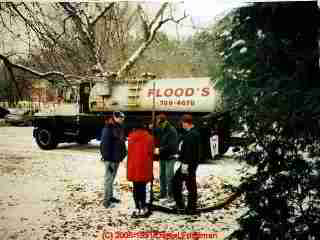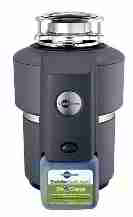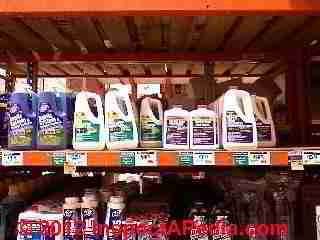 Septic System Maintenance, Septic System Life, Septic Tank Pumping Conclusions
Septic System Maintenance, Septic System Life, Septic Tank Pumping Conclusions
- POST a QUESTION or COMMENT about septic tank maintenance and pumping or cleaning
Septic Tank pump-out schedule & procedure onclusions:
This article contains our conclusions to the septic tank pumping schedule guideline. We explain why a septic tank needs to be pumped regularly, how septic tanks are cleaned, how much it costs to pump a septic tank, how to inspect and clean septic tanks safely, what is septic tank effluent retention time, how to measure septic tank scum and sludge levels, and other septic tank maintenance advice for homeowners.
We point to the role played in septic system life & pumping frequency when a food waste grinder is connected to the system, and when septic treatments or additives are used. We give more information about how often septic tanks should be pumped.
InspectAPedia tolerates no conflicts of interest. We have no relationship with advertisers, products, or services discussed at this website.
- Daniel Friedman, Publisher/Editor/Author - See WHO ARE WE?
SEPTIC PUMPING CONCLUSIONS - Septic Pumping Conclusions, Garbage Disposers, Septic Tank Additives, Buying a Home with a Septic System
Garbage Disposers and Grinders Effects on Septic Systems

Garbage grinders impose an additional solids load on the system. Solids must be removed periodically to prevent them from entering the soil absorption field. If a garbage disposer or food waste grinder is installed in your building you may need to increase the frequency of septic tank pumpout/cleanout.
Review GARBAGE GRINDERS vs SEPTICS and garbage disposal units - effects on septic systems for details.
Septic tank additives
Biological and chemical additives are not needed to aid or accelerate decomposition in conventional residential septic systems.
Products such as yeast, "septic helper" or "septic un-clog chemicals" and the use of additives in septic tanks to reduce the sludge volume or substitute for pumping is not recommended. In fact, relying on additives rather than conventional tank pumping may result in failure of the septic system.
While there may be special procedures to address soil absorption problems, in general chemicals and additives are not needed.
Such septic treatments are illegal in some jurisdictions (and throughout Canada) because they may are not only of marginal effectiveness but also they may contaminate the local groundwater.
What about adding yeast to the septic tank?
Really? "Yeast" which some of our clients like to toss into their septic tank is not helpful and may actually speed drain field failure by keeping the septic treatment tank contents in an agitated state.
Be sure to review details about this topic
at SEPTIC TREATMENTS & CHEMICALS
How Quickly Does A Septic System Fail?
The life of a septic system depends on the following factors:
- Septic Tank Pumping Frequency: providing you are starting with a functional and reasonably-designed septic
system, the most significant step you can take to extend the septic system life is to have the septic tank
cleaned or "pumped" on schedule.
See TANK PUMPING SCHEDULE for a table that determines how often a particular septic tank needs this service. - How the Septic System is Used: including the wastewater usage level and what materials are flushed
down the septic system drains. Conserving water reduces the load on the absorption field. Avoiding flushing
chemicals or items that don't biodegrade reduces the solid build-up rate in the septic tank.
See "Don't Flush these things into a septic system" for a list of what's ok and what's not ok to put into septic tanks and building drains. - Soil Conditions & site drainage such as the soil percolation rate and the amount and level of ground water or surface
water that affect the soil absorption area or drain field.
See SEPTIC DRAINFIELD LIFE
Even a septic tank that is properly located & designed will fail if the drainfield or tank are flooded by groundwater or by running toilets or by water softeners stuck in regeneration mode.
See SEPTIC TANK BACK FLOODING - Septic Tank Materials: a steel septic tank rusts away, first losing its baffles (which lead to
drain field clogging) and eventually rusting at its bottom or sides. The rate of rust depends on the
soil conditions and soil acidity and other factors.
A concrete septic tank can have a very long life, in excess of 40 years, except for cases of poorly-mixed concrete or possibly acidic soils which may reduce that span.
Plastic or fiberglass septic tanks can expect to have a similar life unless they are mechanically damaged. - Life of Special Components such as effluent pumps or septic grinder pumps, septic filters, septic media, and sand bed filter systems often determines the need for repair of alternate-design septic systems that use these components.
So provided you've addressed these factors in septic system life, how long can you expect a septic system to last before costly repairs to the septic tank or septic drain field are required?
Septic systems (tank and absorption system, or onsite wastewater disposal systems) will not fail immediately if they are not pumped. However, an un-maintained septic tank is no longer protecting the soil absorption field from solids.
Continued neglect shortens the drain field life and may result in system failure and even require complete replacement of the soil absorption field. In some cases, site limitations may make replacement of the absorption field impossible - at least impossible using a conventional drainfield design. Alternative designs are available to solve these problems.
The septic tank is only one part of an on-site wastewater system. It is designed to remove solids prior to the effluent entering the soil absorption field, provide for the filtration, digestion of a portion of those solids, and storage of the remaining solids. Taking care of the septic tank will, however, extend the life of the costly second half of the onsite wastewater treatment system - the absorption system, leach field, or drainfield.
More details about the life expectancy of a septic system can be read at
If you have just moved into a home with a septic system
If you've just moved into a home with a septic tank you may not know the size of the septic tank, its maintenance history, or even where the septic tank is. In this case, you should have the tank pumped and inspected. The company pumping the tank will tell you its size, age, and condition.
Below at in the form of individual detailed articles are the Steps in Septic Tank Cleaning Procedure in the order that they should be performed
...
Continue reading at SEPTIC TANK & SYSTEM CARE BASICS or select a topic from the closely-related articles below, or see the complete ARTICLE INDEX.
Or see these
Septic System Condition & Life Articles
- SEPTIC LIFE EXPECTANCY
- SEPTIC DRAINFIELD LIFE
- SEPTIC LIFE MAXIMIZING STEPS
- SEPTIC FIELD FAILURE CAUSES
- SEPTIC TANK PUMPING SCHEDULE
- SEPTIC TANK PUMPING PROCEDURE - home
- SEPTIC SYSTEM AGE
Suggested citation for this web page
SEPTIC PUMPING CONCLUSIONS at InspectApedia.com - online encyclopedia of building & environmental inspection, testing, diagnosis, repair, & problem prevention advice.
Or see this
INDEX to RELATED ARTICLES: ARTICLE INDEX to SEPTIC SYSTEMS
Or use the SEARCH BOX found below to Ask a Question or Search InspectApedia
Ask a Question or Search InspectApedia
Try the search box just below, or if you prefer, post a question or comment in the Comments box below and we will respond promptly.
Search the InspectApedia website
Note: appearance of your Comment below may be delayed: if your comment contains an image, photograph, web link, or text that looks to the software as if it might be a web link, your posting will appear after it has been approved by a moderator. Apologies for the delay.
Only one image can be added per comment but you can post as many comments, and therefore images, as you like.
You will not receive a notification when a response to your question has been posted.
Please bookmark this page to make it easy for you to check back for our response.
IF above you see "Comment Form is loading comments..." then COMMENT BOX - countable.ca / bawkbox.com IS NOT WORKING.
In any case you are welcome to send an email directly to us at InspectApedia.com at editor@inspectApedia.com
We'll reply to you directly. Please help us help you by noting, in your email, the URL of the InspectApedia page where you wanted to comment.
Citations & References
In addition to any citations in the article above, a full list is available on request.
- Our recommended books about building & mechanical systems design, inspection, problem diagnosis, and repair, and about indoor environment and IAQ testing, diagnosis, and cleanup are at the InspectAPedia Bookstore. Also see our Book Reviews - InspectAPedia.
- In addition to citations & references found in this article, see the research citations given at the end of the related articles found at our suggested
CONTINUE READING or RECOMMENDED ARTICLES.
- Carson, Dunlop & Associates Ltd., 120 Carlton Street Suite 407, Toronto ON M5A 4K2. Tel: (416) 964-9415 1-800-268-7070 Email: info@carsondunlop.com. Alan Carson is a past president of ASHI, the American Society of Home Inspectors.
Thanks to Alan Carson and Bob Dunlop, for permission for InspectAPedia to use text excerpts from The HOME REFERENCE BOOK - the Encyclopedia of Homes and to use illustrations from The ILLUSTRATED HOME .
Carson Dunlop Associates provides extensive home inspection education and report writing material. In gratitude we provide links to tsome Carson Dunlop Associates products and services.


